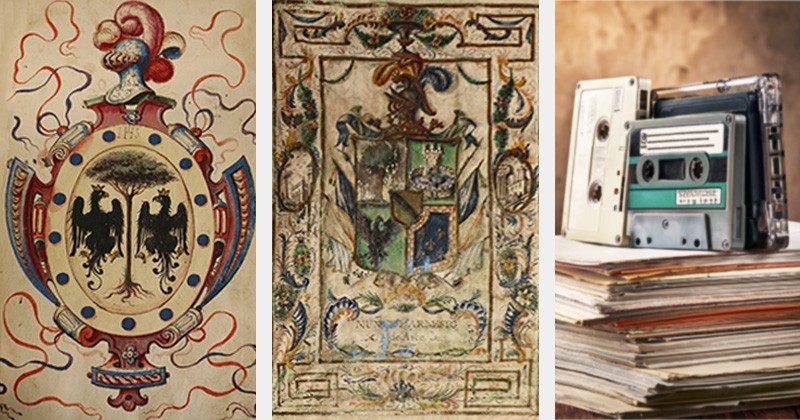


Behind the research
Photo composite by Kris Raser September 26, 2024
Highlighting how Blue Hens use rare materials for their research
There is a deep connection between a scholar and their research subject or materials. This association can be a result of childhood influences, individual culture or even serendipitous happenstance. That is certainly the case for two winners of the 2024 Seth Trotter Special Collections Research Award, an annual award sponsored by the Friends of the University of Delaware Library that encourages UD students and faculty to use rare materials from the Library, Museums and Press Special Collections in their original research.
Winners Jocelyn Alcántara-García, associate professor of art conservation, and chemistry and biochemistry; doctoral student Hannah Grantham; senior Krishanna Prince; and doctoral student Elizabeth Wroten collective research topics were expansive, ranging from Spanish illuminated manuscripts and Black portrait photography to Antebellum Delaware and French silk workers. Below are the stories of two winners: Alcántara-García and Elizabeth Wroten.
Illuminating Illuminated Manuscripts—The Intersection of History, Chemistry and Religion
For Jocelyn Alcántara-García, associate professor and conservation scientist with joint appointments in art conservation, and chemistry and biochemistry, her experiences being raised Catholic in her native language of Spanish turned out to deeply influence her research in forensic analysis of textiles and archival materials.
Alcántara-García’s interest in illuminated manuscripts—hand-written books with painted decoration — first began as an undergraduate student at the National Autonomous University of Mexico. It wasn’t until 2022 when Alcántara-García first met with Rebecca Johnson Melvin, manuscripts librarian in Morris library, that her latent passion for illuminated manuscripts reemerged.
Johnson Melvin showed Alcántara-García two Cartas Ejecutorias de Hidalguía (a type of Spanish illuminated manuscript called Executory Certificates of Nobility) from the Davila family and the Nuñez D. Armesto de Arce family that have since become the focus of multiple research projects Alcántara-García is conducting.
Spanish illumination practices are understudied, especially in comparison to our knowledge of religious documents from other European countries. The executory certificates of nobility that Alcántara-García examined indicate the status of a family and the benefits, like tax cuts, that may suit them. For Alcántara-García, the pigments of the illuminations tell more of a story than the content of the documents themselves. In fact, some of the pigments used in the manuscripts are thought to only be used when illuminating heraldic symbols exclusive to Catholic heavenly figures like the Virgin Mary.
Alcántara-García has already published the first portion of her research project, available freely online. However, that is not the end of her research on this topic. Alcántara-García recently visited the Morgan Library & Museum in New York City to examine similar Spanish documents for extended analysis and hopes to co-curate an exhibition with the UD Library, Museums and Press on illuminated manuscripts that highlights the intersectionality of history, politics, religion and science.
The “Frankenstein” of Research—Carrying the Legacy of UD Professor’s Research into the Future
Elizabeth Wroten, a human development and family sciences doctoral student, used historical data for her research project that was collected before she was even born. Wroten’s research includes the findings of Tamara K. Hareven, late UD professor of human development and family sciences. Hareven bequeathed the contents of her office, including her research data, to the UD Library, Museums and Press and those materials were carefully cataloged in Special Collections. More than 20 years later, Wroten picked up Hareven’s mantle to finish her own research project.
Wroten, who had never stepped foot into Special Collections before, was able to access and use a portion of the Hareven collection for her master’s thesis on the work and lives of silk workers in Lyon, France with support of Library, Museums and Press curators and subject librarians. These materials included raw, unpublished interview transcripts of silk industry workers in Lyon, France during the 1990s, which was part of Hareven’s ethnographic fieldwork. With the transcripts only recorded in French, Wroten taught herself French for the sole purpose of translating six of the transcripts into English before conducting detailed cycles of concept coding, a qualitative research coding style. From there, Wroten analyzed the data to write what would become her master’s thesis.
Wroten’s research explores how work and vocation are deeply tied to identity and family, and the impactful role work-related policies play on family units. The importance of this topic is just as relevant today as it was thirty years ago, with paid family leave, lactation facilities at the office and family participation in the workforce dominating headlines.
Since her early visits to Special Collections, Wroten has not only passed her master’s thesis defense but also published a pilot research paper on the topic. Her paper, along with her thesis, are the beginning of a research collection that complements Hareven’s. Wroten, currently conducting dissertation research on academic retirement and legacy planning, hopes to return to the Hareven collection for future research projects.
Seth Trotter Special Collections Research Award
Since 2022, the Seth Trotter Special Collections Research Award (formerly known as the Essay Contest) has celebrated original research using the rare and unique materials available in Special Collections. Those who wish to support the Friends and the future of this award can do so on the Friends website.
Contact Us
Have a UDaily story idea?
Contact us at ocm@udel.edu
Members of the press
Contact us at mediarelations@udel.edu or visit the Media Relations website

